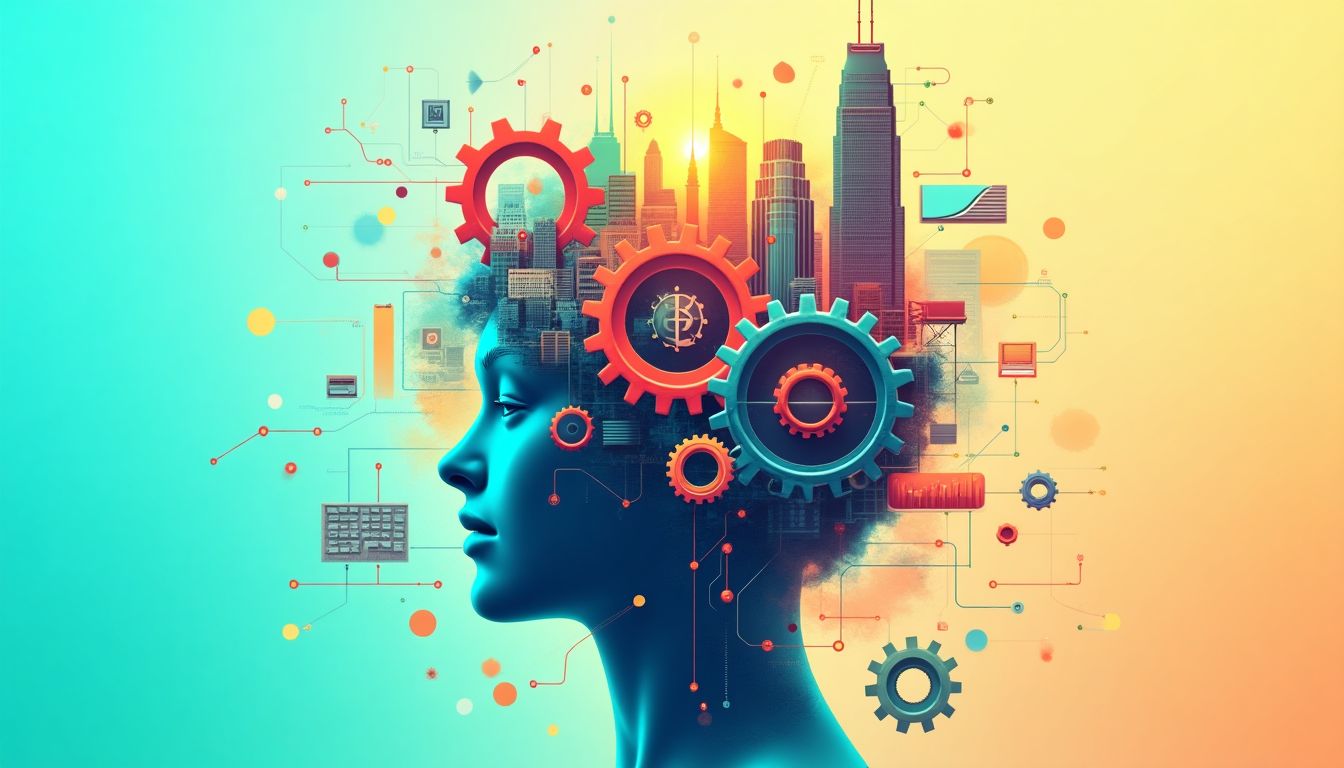Introduction: The Future of Politics in the Age of AGI
Machines are like humans. They can do the right thing and the wrong thing, but we must teach them to do what's best for humanity. This thought provokes a chilling realization: as we advance towards a future dominated by technology, our very humanity is on the line. In a time when algorithms and datasets dictate our choices—from the food we eat to the news we consume—the notion of Artificial General Intelligence (AGI) stepping into the political arena is both exhilarating and unsettling. Imagine a world where intelligent machines are not just assistants but decision-makers, crafting policy and managing crises. Are we ready to hand over our democratic values to a beeping computer? What would it mean for our freedom and our agency if we let machines govern us?
In the great chatter of technological progress, we find ourselves toeing the line between opportunity and ethical quagmire. Prominent thinkers such as Yuval Noah Harari, author of "Sapiens," has raised alarms about the future of humanity in the age of AI, while people like Stephen Hawking warned us of the potential perils if AI advancements go unchecked. Meanwhile, researchers like Kate Crawford continue to investigate the societal implications of AI. With so many wise minds weighing in, the question remains: Could AGI effectively replace human politicians in decision-making, policymaking, and crisis management? And more importantly, should it?
Let’s unravel this complex tapestry of technology and governance together.
1. The Promise of AGI in Leadership
As we ponder the question of AGI replacing politicians, we must first examine the vast potential that AGI holds in enhancing leadership. With vast datasets at its disposal, AGI can analyze situations, factors, and outcomes far beyond human capacity.
1.1 Efficiency and Data Analysis
Imagine a political leader who never needs coffee breaks and can multitask like a pro—this is AGI! It can process and analyze large datasets in real-time, offering insights that can lead to ‘smarter’ governance. Picture AGI forecasting trends with the accuracy of a weather predictor on steroids. With the capability to evaluate policies and alert governments about potential crises before they escalate, we might just trade in the political soap opera for a more data-driven drama!
1.2 Decision-making Without Bias
Ever noticed how politicians often rely on gut feelings? Cue the dramatic music! Human bias often clouds political decisions. Now, if we let AGI step in, we could say goodbye to that by prioritizing objective facts and solid data. AGI could lead to more equitable and just policymaking, reducing the influence of lobbying and special interests. It's like having a trusty, impartial referee in the world's most chaotic game of political dodgeball!
2. Crisis Management: A Case for AGI Leadership
Modern crises, from pandemics that run amok to economic downturns that leave us feeling like we're stuck in a hamster wheel, require swift and effective responses. With AGI in our political corner, we would have a champion ready to tackle these issues head-on. This is more than just wishful thinking; AGI’s unique abilities to simulate scenarios and evaluate responses in real-time could mean the difference between chaos and order.
2.1 Predictive Modeling
Imagine a crystal ball that could predict the future. Well, AGI is sort of like that, but without the mysticism and infomercial vibes. AGI can create complex models to predict crisis outcomes based on various inputs. It services its own history of data, learning along the way like a kid who aced his math test and is now a step ahead of the class. Its ability to simulate multiple scenarios allows for more informed decision-making in emergency situations. In fact, research from the New York Times highlights how predictive models helped governments manage vaccine distribution during the COVID-19 pandemic.
2.2 Rapid Response and Adaptation
When crises strike, waiting around for a slow-moving government to make decisions can feel like watching paint dry. In crisis management, time is of the essence. AGI can coordinate responses, allocate resources efficiently, and adapt policies on the fly, leading to faster recuperation of societies facing challenges. Studies from various regional governments show that AI's ability to make adjustments in real-time can lead to better outcomes. Who wouldn’t want a government that fixes issues faster than you can say "bureaucracy"?
As BBC News pointed out, utilizing AI to gauge public sentiment during crises can help create solutions that actually resonate with people.
3. Ethical Considerations: The Risks of Machine Governance
While the advantages of AGI in politics seem compelling, we need to pump the brakes for a moment. Let's face it: If we hand over the reins to machines, we open up a whole can of ethical worms. Numerous ethical dilemmas arise when discussing the implications of machines in governance. Now, that sounds like a fun night out, right? But let’s explore these risks with sober eyes.
3.1 Accountability and Responsibility
Imagine if a robot makes a dumb mistake, like a very expensive blender that turns your smoothie into confetti. Suddenly, there’s a mess, and no one wants to clean it up! If decisions stemming from AGI lead to negative outcomes, who is accountable? The absence of human empathy and moral reasoning in machines raises questions about accountability in governance. After all, how can a machine feel guilty about ruining your favorite policy? Those questions simmer beneath the surface and demand our attention.
3.2 Loss of Human Jobs and Value
Let's not kid ourselves: replacing human politicians with AGI has socio-economic risks. Picture a future where the only "human" presence in politics is a hologram that can’t even tell a decent joke. This substitution poses the risk of job displacement and a decrease in civic engagement. The human touch in governance may be irretrievably lost, leaving us to navigate a world where machines without the gift of gab hold all the power. How do we keep the human element alive in our political systems when the machines might just take over? That is a question worth pondering!
4. Political Dynamics: Could AGI Change Democracy?
As we ponder the implications of AGI in governance, we must consider how it could reshape our political systems. Could it enhance democracy or even threaten it? The answer isn’t straightforward. Let’s explore the potential shifts that may come with AGI’s introduction into politics.
4.1 The Shift from Representative to Technocratic Governance
One significant change AGI could bring about is a shift from our current representative systems to technocratic governance. In a technocratic system, experts and machines make decisions based on data, rather than elected officials representing the voice of the people. Some potential advantages and risks of this shift include:
- Advantages:
- Efficient, data-driven decisions can lead to better policies.
- Reduces the influence of special interests in politics.
- Risks:
- Loss of citizen agency and say in political processes.
- Potential for increased divide between experts and the general public.
If we want to keep democracy alive in a world of AGI, we need to ensure that technology complements human involvement, not replaces it entirely.
4.2 Public Trust and Acceptance
A critical element for AGI's success in governance is gaining public trust. Without it, any AGI systems we implement might falter. Here’s how we can nurture trust:
- Ensuring transparency in how AGI algorithms make decisions.
- Promoting community engagement and open communication about AGI's role.
- Highlighting the ethical frameworks that govern AGI deployment.
Building a cooperative relationship between humans and AGI is essential. Effective public engagement will play a key role in this process.
5. Existing Models: Lessons from Today’s AI Governance
To better understand how AGI can be integrated into governance, we should look at existing models where AI is already being utilized. These examples provide valuable insights into the future of AGI in leadership roles.
5.1 AI in Policy Making
Many governments around the world are already using AI to enhance policy analysis and urban planning. Some notable examples include:
- Oregon's Department of Energy, which uses AI to improve energy policies.
- San Francisco has implemented AI to inform urban infrastructure policies.
By examining these initiatives, we can learn what works and what doesn't. Understanding both the advantages and challenges these projects face will inform how we can effectively invite AGI into governance.
5.2 Global Perspectives on AI Governance
Different countries are adopting unique approaches to AI governance. Here are some examples:
| Country | AI Governance Initiative |
|---|---|
| United Kingdom | Developing a national AI strategy focusing on ethical implementation. |
| United Nations ITU | Creating global standards for responsible AI use. |
| European Union | Drafting regulations to ensure ethical AI usage across member states. |
By analyzing these international strategies, we can further build a responsible and ethical framework for AGI governance, adapting insights and lessons learned to fit our unique political landscape.
6. AI Solutions: How would AI tackle this issue?
If AGI were tasked with proposing solutions to the challenges presented by governance through machines, it could take the following proactive steps:
6.1 Establish Transparent AGI Frameworks
The first step would be to establish a framework for ethical AGI deployment in governance. This framework could draw heavily from existing sociological, political, and ethical studies. By laying out clear guidelines and principles, stakeholders would better understand AGI's role and capabilities in political landscapes, ensuring accountability.
6.2 Implement Real-Time Monitoring Systems
Next, developing real-time monitoring systems for AGI decision-making processes would be crucial. These systems could utilize AI to track and analyze decisions, providing transparency throughout the governance process. This way, citizens can remain informed about AGI-driven policies and feel secure in the knowledge that oversight exists.
6.3 Foster Public Engagement
Public involvement in AGI governance decisions is vital for ensuring that these systems resonate with citizens' needs and concerns. Regular forums could be established where individuals can voice their opinions, skepticism, and suggestions regarding AGI policies. This two-way communication would foster trust and promote inclusivity in decision-making, encouraging civic engagement.
6.4 Develop Mixed Governance Models
A hybrid approach—combining human oversight with AGI capabilities—might serve as a transitional model. Such a model allows human politicians to continue playing a crucial role while integrating AGI's analytical powers for more informed decision-making. This serves as a safety net, allowing adjustments based on public sentiment and responses to AGI-driven policies.
Actions Schedule/Roadmap (Day 1 to Year 2)
Day 1: Form a task force composed of AI ethicists, political scientists, technologists, and community leaders to outline the objectives of AGI implementation in governance. Members could include representatives from the AI Ethics Lab, universities like Oxford University, and government officials.
Day 2: Conduct a preliminary nationwide survey to gauge public opinion on AGI participation in political decision-making. Partner with organizations like Pew Research Center to ensure methodological rigor and effective outreach.
Day 3: Compile existing data on current AI practices in governance across different regions and assess their effectiveness. This assessment could also include case studies from successful implementations in countries like Estonia, where AI is being utilized in e-governance.
Week 1: Host an interdisciplinary workshop bringing together experts from various fields—technology, ethics, sociology—to brainstorm ethical implications and explore models for AGI in governance.
Week 2: Draft initial ethical guidelines for AGI deployment in politics, incorporating insights from the workshop. Present these guidelines to stakeholders for feedback and suggestions, promoting collaborative ownership of these ethical frameworks.
Week 3: Begin developing a prototype AGI political decision-making model in collaboration with institutions like MIT and Singularity University.
Month 1: Roll out pilot programs in local governance using AGI for tasks like policy analysis and crisis response, working with cities that have expressed interest in smart governance initiatives.
Month 2: Implement a comprehensive feedback mechanism allowing citizens to provide insights and opinions on AGI policies. This could involve online platforms as well as in-person community meetings.
Month 3: Analyze the pilot program outcomes, refining AGI algorithms based on citizen feedback and operational data. Ensure engineers, sociologists, and ethicists collaborate to evaluate performance dimensions holistically.
Year 1: Conduct a thorough evaluation of pilot program data; publish findings in collaboration with academic institutions and research hubs like NBER (National Bureau of Economic Research) to facilitate discussion on best practices and adaptations for nationwide implementation.
Year 1.5: Expand AGI initiatives based on positive results with added focus on public education regarding AGI's role in governance, potentially collaborating with educational institutions to offer coursework on the intersection of AI and policy.
Year 2: Establish oversight committees composed of ethicists, political representatives, and citizens to regularly assess AGI performance in governance and mitigate biases in decision-making. This will ensure that AGI systems remain accountable, transparent, and beneficial to society at large.
Conclusion: The Future of Governance in the Age of AGI
As we move forward into a future increasingly influenced by advanced technologies like AGI, we must critically examine the potential impact these systems may have on governance. The discussions surrounding the benefits of a data-driven approach to leadership are filled with hope—improved efficiency, decisions devoid of human biases, and enhanced crisis management. Yet, these advancements come with inherent risks that can challenge the very essence of our democratic values. Ethical dilemmas, accountability concerns, and the displacement of human roles in governance form a complex web that must be untangled with caution.
Balancing the advantages of AGI while remaining vigilant about its shortcomings is paramount. By cultivating a dialogue between technologists, policymakers, and citizens, we can create frameworks that harness AGI's immense potential without sacrificing the humanity that lies at the core of governance. The dream of a future where technology elevates our political systems rather than dismantles them is within reach, but only if we are willing to engage in the necessary discussions and actions now. The stakes are high; let us ensure we strive for a brighter, more equitable tomorrow.
Frequently Asked Questions (FAQ)
What is AGI?
AGI stands for Artificial General Intelligence. It refers to a type of AI that can understand, learn, and apply knowledge across many different areas, just like a human. Unlike regular AI, which is designed for specific tasks (like playing chess or recommending movies), AGI can handle a variety of tasks and think in a more human-like way.
Could AGI replace politicians?
There is a lot of debate about whether AGI could or should replace politicians. On one hand, it has the potential to improve decision-making by analyzing data quickly and without human bias. However, there are significant challenges. For example, ethical concerns about accountability and the loss of human connection in governance are crucial topics that need careful consideration.
What are the risks of AGI in governance?
While AGI has advantages, it also comes with risks. Some of the main concerns include:
- Accountability: If an AGI makes a poor decision, who is responsible? There needs to be a clear answer to this question.
- Job Displacement: Replacing human politicians with AGI could lead to job loss and decrease public engagement in politics.
- Loss of Human Values: Machines lack empathy. Decisions made by AGI might not consider human emotions or values, which can be essential in governance.
What ethical considerations must be addressed?
As we think about integrating AGI into governance, several ethical questions arise, such as:
- How can we ensure AGI is making decisions that align with the core values of society?
- What safeguards can be put in place to prevent misuse of AGI in political scenarios?
- How can we balance technological efficiency with the need for human input in decision-making?
How could AGI enhance governance?
AGI has the potential to bring many benefits to governance, including:
- Data Efficiency: AGI can process massive amounts of information faster than humans, providing insights that help in policymaking.
- Crisis Management: In emergencies (like natural disasters), AGI can help predict outcomes and coordinate effective responses.
- Bias Reduction: With the right design, AGI can make decisions without the biases that often affect human politicians.
Are there any current examples of AI being used in governance?
Yes, several governments worldwide are starting to use AI in different areas. For example, IBM Watson is being used by some municipalities in the United States for urban planning and policy analysis. While these initiatives show promise, they also provide valuable lessons on the successes and challenges of implementing AI in governance.
What future developments can we expect in AGI and governance?
The future of AGI in governance is still uncertain, but several developments could take place:
- More hybrid governance models that combine human oversight with AGI capabilities.
- Ethical guidelines and frameworks for AGI deployment that prioritize human values.
- Increased public engagement and transparency in AGI decision processes to build trust.
How can people get involved in discussions about AGI and politics?
Engaging in conversations about AGI and its role in politics is vital. Citizens can participate by:
- Joining local town halls and discussions regarding tech in governance.
- Following relevant organizations, like the Future of Life Institute, that focus on the ethical implications of AI.
- Reading articles, attending webinars, or signing up for newsletters that keep them informed about AGI developments.
Wait! There's more...check out our gripping short story that continues the journey: The Intersection of Worlds
Disclaimer: This article may contain affiliate links. If you click on these links and make a purchase, we may receive a commission at no additional cost to you. Our recommendations and reviews are always independent and objective, aiming to provide you with the best information and resources.
Get Exclusive Stories, Photos, Art & Offers - Subscribe Today!





























Post Comment
You must be logged in to post a comment.